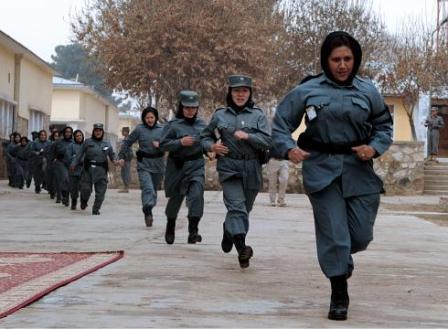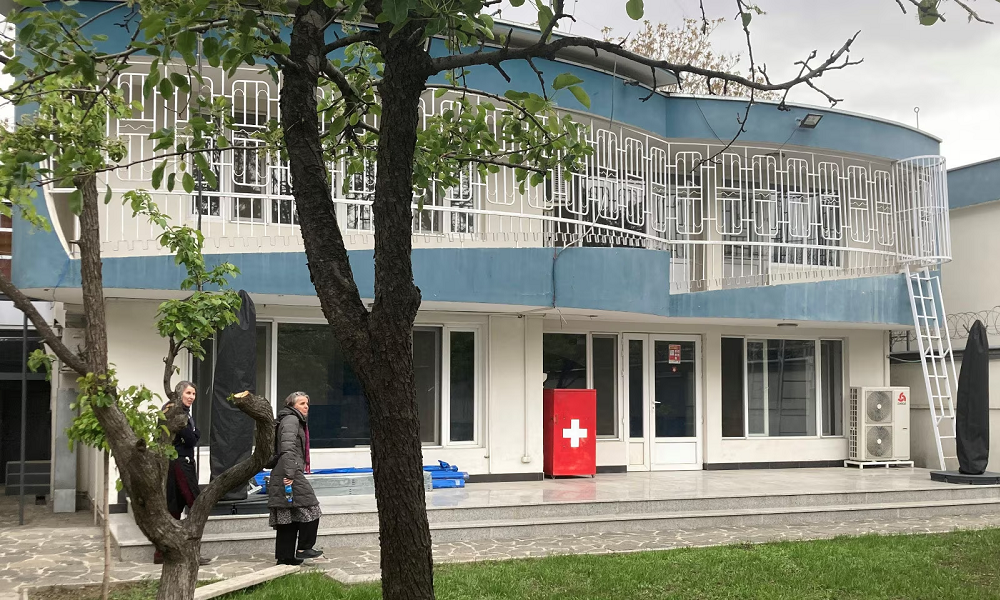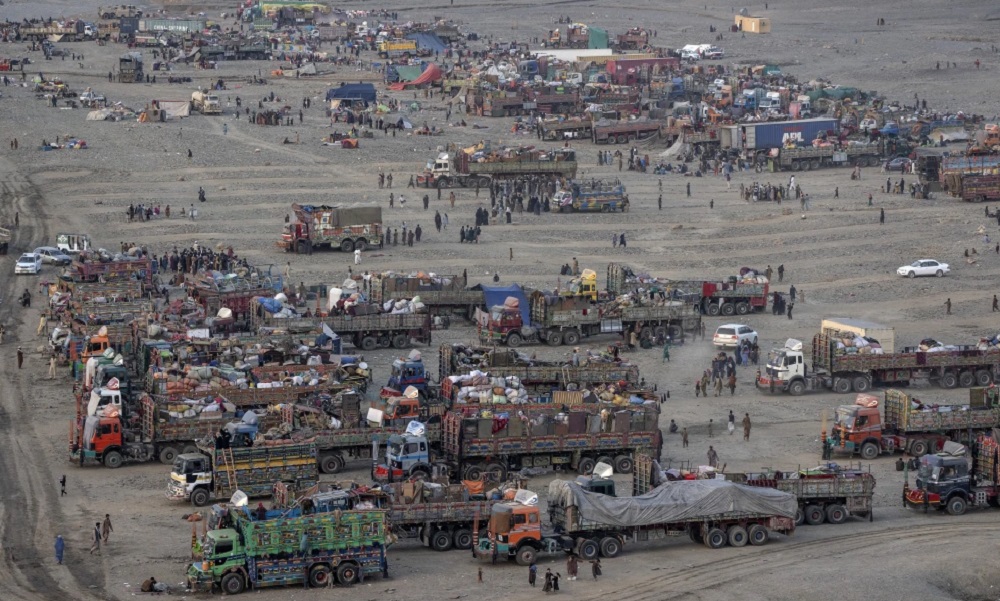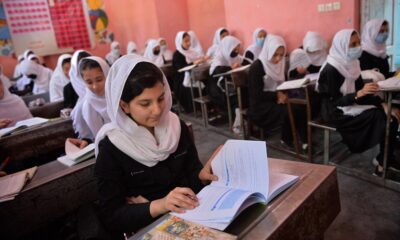Latest News
MoI Seeks to Rise Number of Afghan Policewomen

 Afghanistan should dramatically increase the number of women in the service and police ranks to struggle to end crimes such as domestic abuse, forced marriage and “honour” killings.
Afghanistan should dramatically increase the number of women in the service and police ranks to struggle to end crimes such as domestic abuse, forced marriage and “honour” killings.
There is only one female police officer for every 10,000 women in Afghanistan.
The Ministry of Interior (MoI) says the presence of Afghan women in police ranks is an essential need.
A large number of unresolved crime cases of last year is making Afghanistan’s Ministry of Interior Affairs take measures to improve this statistic. One such measure is to increase the number of women in Afghanistan’s police ranks.
Interior minister declared that further efforts are made to create facilities for Afghan policewomen compared to the past.
“Presence of women in police ranks is an important need and it can reduce violence,” said Taj Muhammad Jahid, interior minister.
In the meantime, Afghanistan’s first lady called Afghan policewomen a key nut for implementation of the constitutions.
“The presence of women in police ranks has eased the implementation of law and Afghan women can clearly describe their problems; As representative of President, I fully support them,” said Rulla Ghani, Afghanistan first lady.
Today, peace in Afghanistan is protected by 2,875 female police officers who are involved in the fight against terrorism and drug trafficking. It is obvious that there is a need for more women in the Afghan police ranks. The challenge for the Ministry of Interior is to recruit 10,000 women by the end of March 2017.
It is definitely not an easy task for women in Afghanistan to serve as police officers. There are many taboos and at times they are stopped by their own family due to the high risk and dangerous nature of the job.
According to the official statistics, tens of thousands of women are currently studying and working in various fields across Afghanistan.
It is worth mentioning that not all of the provinces have a similar situation. The women usually get jobs that are situated in their home province as to not get separated from their families.
Although women in Afghanistan have become more empowered over the past 15 years and are now working as cabinet members, legislators, politicians, businesspeople, artists and singers, they continue to face discriminatory practices in patriarchal Afghanistan and in some areas they are not allowed to choose their life partner.

Latest News
Switzerland re-establishes presence in Kabul with humanitarian office

Switzerland’s foreign ministry announced on Monday it re-established its presence in Kabul by opening a humanitarian office to assist Afghanistan’s most vulnerable populations.
The ministry said in a statement that with 24 million people in Afghanistan relying on humanitarian aid and most of the population living below the poverty line, the office aims to provide critical support.
Four specialists from the Swiss Humanitarian Aid Unit (SHA), along with ten local employees, are now working on the ground. Their efforts are focused on ensuring that vulnerable communities receive the necessary resources to meet their basic needs, helping to alleviate the ongoing humanitarian crisis in the country, the statement read.
Since the IEA’s takeover in August 2021, Switzerland closed its cooperation office in Kabul and evacuated all its staff.
Latest News
Pakistan plans to expel 3 million Afghan refugees this year

Pakistan plans to expel 3 million Afghans from the country this year, as a deadline for them to voluntarily leave the capital and surrounding areas expired on Monday, The Associated Press reported.
It’s the latest phase of a nationwide crackdown launched in October 2023 to expel foreigners living in Pakistan illegally, mostly Afghans. The campaign has drawn fire from rights groups, the Islamic Emirate, and the U.N.
Arrests and deportations were due to begin April 1 but were pushed back to April 10 because of the Eid al-Fitr holidays marking the end of Ramadan.
About 845,000 Afghans have left Pakistan over the past 18 months, figures from the International Organization for Migration show.
Pakistan says 3 million Afghans remain. Of these, 1,344,584 hold Proof of Registration cards, while 807,402 have Afghan Citizen Cards. There are a further 1 million Afghans who are in the country illegally because they have no paperwork.
Pakistan said it will make sure that Afghans do not return once deported.
Authorities wanted Afghan Citizen cardholders to leave the capital Islamabad and Rawalpindi city by March 31 and return to Afghanistan voluntarily or be deported.
Latest News
Some countries preventing Afghanistan from gaining its seat at the UN

The Islamic Emirate’s spokesperson Zabihullah Mujahid says some Western countries, including the US, are preventing Afghanistan from gaining its seat at the United Nations.
Mujahid added that the US and its allies hold significant influence over the policies of the UN, and due to their defeat in the Afghanistan war, they are attempting to continue wartime policies.
“Some countries that fought against the Afghans for twenty years still have not changed their wartime policies and continue along the same path, which naturally has its effects,” said Mujahid.
He emphasized that the Afghan people have the right to secure this seat, and the IEA will continue to work to obtain it.
He also rejected the notion of Afghanistan being isolated, stating that despite Western pressures, the acting government has expanded its diplomatic relations with regional and global countries.
He stated: “Afghanistan is not isolated; every country naturally faces some challenges with others, but we have extensive regional and international engagements.”
However, experts believe that the UN will not grant Afghanistan’s seat to the IEA until they take concrete steps to meet the international community’s preconditions, such as establishing an inclusive government, ensuring human rights—especially women’s and minority rights—and effectively combating terrorism and narcotics, to satisfy the world.
Despite over three and a half years since the IEA’s takeover, no country has officially recognized the regime.
Meanwhile, many countries have engaged with the IEA and established good diplomatic relations with the caretaker government, which the IEA believes serves as a form of recognition of Afghanistan’s current government.
-

 Latest News5 days ago
Latest News5 days agoAfghanistan has the right to access Amu River’s water: Uzbek minister
-

 Latest News4 days ago
Latest News4 days agoAmnesty international urges Pakistan to halt Afghan deportations
-

 Latest News5 days ago
Latest News5 days agoUN ‘deeply disappointed’ over ongoing ban on girls’ secondary education
-

 Latest News4 days ago
Latest News4 days agoAfghanistan-Iran-Europe railway corridor activated
-

 Business4 days ago
Business4 days agoAfghanistan ships first consignment to Europe via Khaf-Herat railway
-

 Business3 days ago
Business3 days ago36 mining contracts inked over the past year: Mines ministry
-

 Sport4 days ago
Sport4 days agoDe Kock fireworks see Kolkata thrash Rajasthan in IPL
-

 Latest News3 days ago
Latest News3 days agoDried fruit market in Herat booms ahead of Eid-al-Fitr
















